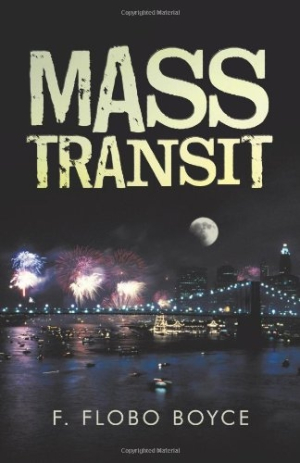
Mass Transit
Mass Transit, a collection of seven short stories and twenty-eight poems by F. Flobo Boyce, is presented in sections whose names follow a transportation theme. The book’s first story, “The Groomsman” involves a taxi driver who needs a bodyguard because he witnessed a murder, and the second piece, “Ice Cream Man,” is about a high school graduate who gets a summer job driving an ice cream truck. Other than these first two stories, the subject matter of the work has no connection to the theme of mass transit.
The stories are written in an emotionally detached voice reminiscent of tales like The Heart of Darkness. The writing is generally good, but the stories lack the insight and depth that make for greatness, and tension is nearly absent. Even as Adam, the taxi driver in “The Groomsman,” fears for his life, emotion is suppressed as the author merely relates events to the reader.
The understated nature of the narrative in Mass Transit extends even to climaxes which are sometimes hard to find. This is the case in “Negotiations,” where business rivals work together for the first time. Despite previous animosity, teamwork succeeds. The revealing of a piece of information substitutes for dynamic characters or exciting action. The result is a piece that is more like a sketch than a story. Similarly, in “Progeny,” archeologists hunt for treasure, revealing bits of information that substitute for plot development. “Pally’s Bar and Grill” could also be described as a sketch: A stranger enters the bar, and conversation ensues, information is revealed, but nothing changes.
In “Ink,” a high school student disobeys her mom, goes to a party, and gets a tattoo. The confrontation which should serve as a climax is minimal, and, because mom changes her mind, the actions in the denouement negate the premise of the story’s conflict. “Manhattanhenge,” the most complete story in this volume, is about a sorry little man never brave enough to get a better job, or ask the girl for a date. His passive aggressive behavior gets him in trouble, and he plans to commit suicide. With nothing left to live for, he finds the courage to tell the girl he likes her and to tell off his boss. This piece, with its ironic twist, is the volume’s best.
Mass Transit’s poems are very similar in nature to the stories; they are vague, mostly understated, and fail to effectively get their point across. They range in themes from pigeons in the city to a wallflower at a party, from gangland violence to clouds.
While the writing in Mass Transit is good, in the end, most of the pieces will leave readers unsatisfied.
Reviewed by
David George
Disclosure: This article is not an endorsement, but a review. The publisher of this book provided free copies of the book and paid a small fee to have their book reviewed by a professional reviewer. Foreword Reviews and Clarion Reviews make no guarantee that the publisher will receive a positive review. Foreword Magazine, Inc. is disclosing this in accordance with the Federal Trade Commission’s 16 CFR, Part 255.
